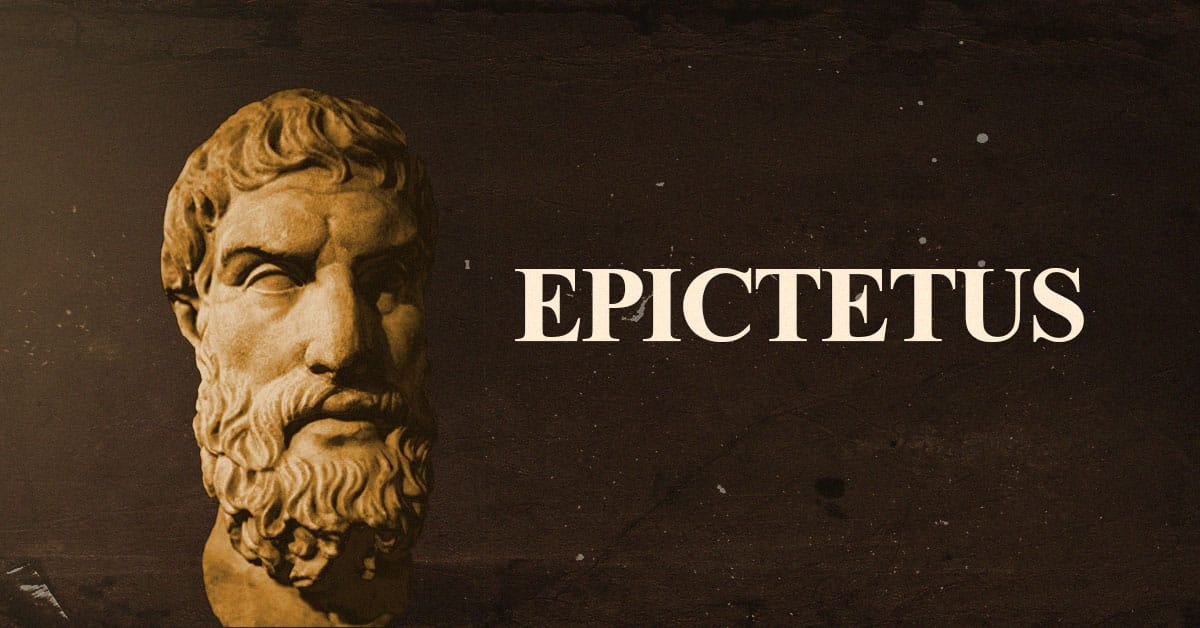
Epictetus was born in a Greek city in Asia Minor, Hierapolis, sometime in the 50s A.D. For a portion of his early life, he was enslaved to an important member of Nero’s court named Epaphroditus. Though he was a slave, he was permitted to study Stoic philosophy under the tutelage of Musonius Rufus, a Stoic philosopher and Roman Senator. This is one of the reasons he became a legandary philosopher; "Epictetus Quotes" are one of the most powerful ways to become acquainted with Stoic thought.
It’s unclear when exactly Epictetus was granted freedom, but it’s believed that it was sometime after the death of Nero in 68 AD. He then went on to teach philosophy in Rome until philosophers were banned from the city around 93 AD by the Roman emperor Domitian.
Epictetus spent the rest of his life in northwestern Greece, where he founded a school of philosophy. His ideas were written down and published by his most famous student, Arrian.
Epictetus is known to have only had very few possessions and lived a life of great simplicity. He was a proponent of the idea that philosophy is a way of life rather than just an abstraction. Let’s explore some of the best quotes of Epictetus, which, nearly two thousand years later, offer profound insights into the path to a happy life.
The Stoics often refer to the term Eudaimonia, which literally translates to “good spirit.” Since the origin of the philosophy with Zeno of Citium around 300 B.C., Stoic philosophers have been discussing how one can live a virtuous life in order to obtain eudaimonia. To Epictetus, the most important thing you can do in order to live a good life is to understand the difference between what isn’t in your control and what is, and act accordingly.
“The chief task in life is simply this: to identify and separate matters so that I can say clearly to myself which are externals not under my control, and which have to do with the choices I actually control. Where then do I look for good and evil? Not to uncontrollable externals, but within myself to the choices that are my own…"
-Epictetus
In this quote, you can find a well-spoken summary of one of the guiding philosophies of Epictetus’ prescription for a happy life. He believed that life consists of both external events that are out of one’s control as well as circumstances that are within one’s control.
For events that you can’t change, Epictetus argues that you should learn to accept them with a calm disposition. However, for those things that you can change, you should utilize rigorous self-discipline and take responsibility for your actions.
It’s easy to get bent out of shape about world events or life circumstances that are simply too far out of bounds for you to alter.
In fact, you can see examples of this problem all around you if you stay even remotely tapped into contemporary pop culture. It seems that just about everyone has an opinion about how to solve major world issues and which people or ideologies are responsible for evil in the world. However, there’s a good chance that if you were able to peer into these individuals' particular lives, you might find they are far too concerned with changing things out of their control and could stand to take a bit more responsibility for their own lives.
The beautiful thing about this approach to life is that the more you take responsibility for your life, the larger your potential sphere of influence becomes. By starting with yourself and taking control over the things you have the power to change, you’re increasing the likelihood that you will be able to affect change on a larger scale in the future.
“It’s not what happens to you, but how you react to it that matters.”
-Epictetus
What if you could change your whole life by changing the way that you think about things?
It’s all too easy to feel sorry for ourselves in this day and age, with our culture seemingly promoting the idea of being a victim as some heroic title. Of course, it goes without saying that to be alive can be a tremendous struggle, and suffering is very real. That being said, choosing to see yourself as a victim is practically a self-fulfilling prophecy.
For example, let’s say that you unexpectedly got fired from your job.
This is likely a huge blow and could be cause for enormous amounts of stress in terms of how you will pay your bills, care for your family, etc. You might be concerned about what others will think of you, or you might be furious at the manager that threw you under the bus. The shock in itself could be enough to leave someone wallowing in bed for a month or more.
However, what if you actively chose to look at it another way? What if you consider the fact that you’ve always hated your job, and always felt that it was holding you back from your true purposes? From this angle, getting canned could be the catalyst that allows you to be the person you really want to be.
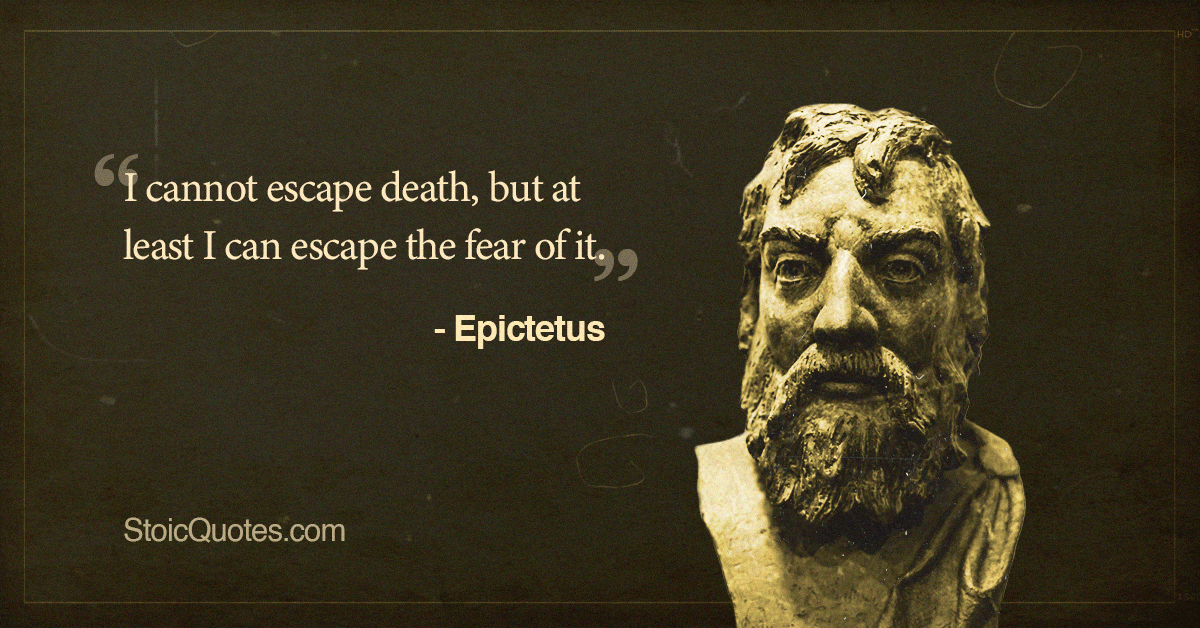
If you can adopt the philosophy of Epictetus in regards to death, you might just find it fundamentally changes how you live. Death is something that no one can escape, but the way you perceive death is entirely within your control.
“I cannot escape death, but at least I can escape the fear of it.”
-Epictetus
Do you have any control over the fact that you will die someday? How about your partner, your family, and your friends?
The idea that there might be some magic antidote to aging and death has been kicking around for millennia, but at the end of the day, death is a reality we simply cannot escape.
Within Epictetus’ philosophy, this means that you must learn how to accept death as it is an external condition that you have no control over. What you do have control is over whether or not death is something you fear.
How much of what we do (and perhaps, more importantly, don’t do) is guided by a fear of death? For something that presumably influences many of our major life decisions, death isn’t something that we talk about much in modern society.
What if you seriously contemplated what death means to you, both in terms of your own death and the death of those you love? What if you could accept the inevitability of death and no longer fear it? Chances are, it will change the way you live for the better.
“What is death? A scary mask. Take it off – see, it doesn’t bite. Eventually, body and soul will have to separate, just as they existed separately before we were born. So why be upset if it happens now? If it isn’t now, it’s later.”
-Epictetus
In this quote, Epictetus likens death to a frightening mask that you can choose to remove. While our society often seems to propose that death is full-on annihilation, Epictetus believes that it is merely a separation of our soul from our physical form.
Death is inevitable, meaning that one simply must accept this reality as an external force that cannot be changed. What is in your control, as outlined in the previous quote, is the way that you view death. If you can adjust your expectation that death is scary, and instead understand it as a neutral, unchangeable occurrence, you might find you make decisions that further enhance your ability to be happy and virtuous today.
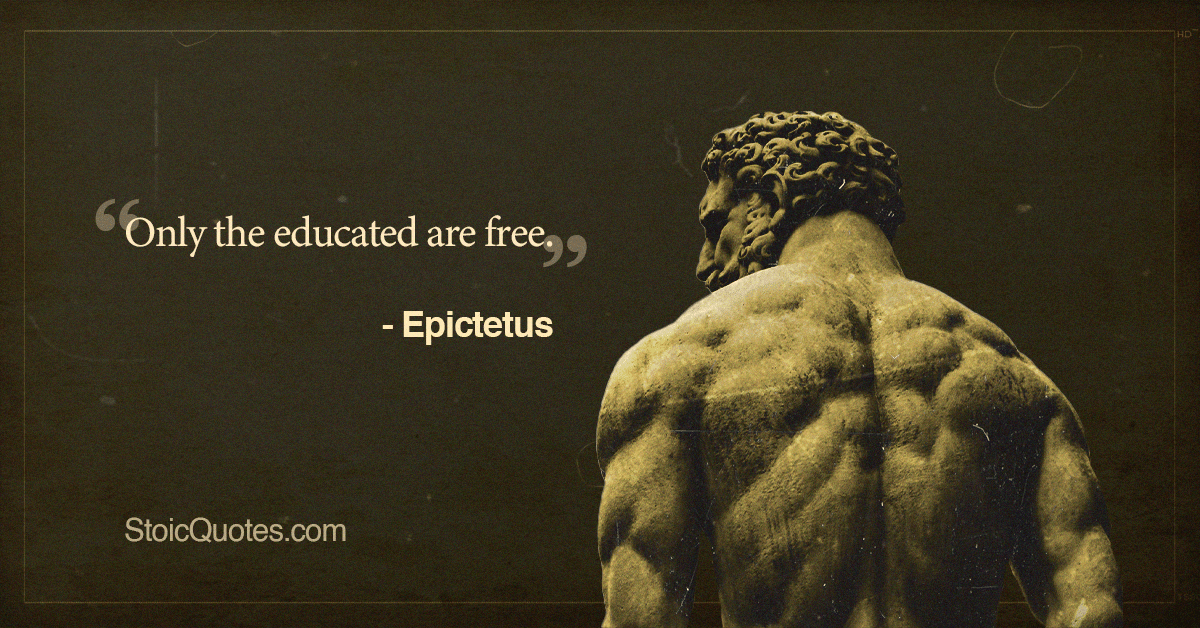
According to Epictetus, freedom is “the right to live as we wish” and nothing more. However, being free doesn’t mean being free to lie around all day eating ice cream and watching Netflix. Obtaining freedom is something that comes from taking complete responsibility for the things that you can control and relinquishing control over external occurrences.
“No man is free who is not master of himself.”
-Epictetus
These words by Epictetus hit home even harder when you know that he spent a portion of his life as a slave. Remember, you only have control over yourself and your actions within Epictetus’ view, so this is what you should concern yourself with rather than external events that are outside your sphere of influence.
If you desire freedom, consider taking more responsibility, not less. Within this line of thinking, being free doesn’t have anything to do with what the world dishes out to you, but what you do to take control over the things you can change.
“Only the educated are free.”
-Epictetus
In modern terms, we tend to think of a person who is educated as someone who possesses advanced degrees from prestigious universities. While those people might certainly qualify as being educated, it’s worth noting that going to school isn’t the only way to get an education. In fact, most of us have probably had experiences outside of the classroom that were far more educational than the hours spent listening to lectures or doodling in our notebooks waiting for time to pass.
Some might argue that pursuing traditional education leaves people far from free, when you consider how much debt people commonly take on to meet this end, at least in the U.S. Consider taking your education into your own hands, and being thoughtful about what knowledge you can obtain that would help you take better control over the things that you can change for the better.
When you read Epictetus’ thoughts on friendship, you see that he takes a much more realistic perspective than many modern, saccharine takes on the topic. Sure, it’s good to have friends, but will just any friends do? Do you have control over who you surround yourself with, and could it even be your responsibility to find people to be around that fundamentally support you?
Additionally, Epictetus puts forth the reality that people change over time, and that the relationships they keep will change as well. If you are really working to improve yourself, you’ll eventually find yourself confronted with the task of choosing between your own growth or your relationships. It’s on this point that Epictetus provides particularly profound advice.
“The key is to keep company only with people who uplift you, whose presence calls forth your best.”
-Epictetus
If you find yourself surrounded by people who are always bringing you down, realize that there’s a good chance this is something that is within your control. You’ve likely heard the axiom that “you are the average of the five people you spend the most time with.” Consider seeking out relationships that bring out the best in you, and moving away from those that don’t.
“Above all, keep a close watch on this— that you are never so tied to your former acquaintances and friends that you are pulled down to their level. If you don’t, you’ll be ruined. . . . You must choose whether to be loved by these friends and remain the same person, or to become a better person at the cost of those friends . . . if you try to have it both ways you will neither make progress nor keep what you once had.”
-Epictetus
An interesting thing can happen when you start to try and better yourself. You might find that the people around you are particularly critical of your new enthusiasm towards creating a happy life, and you might feel pressure to not change in order to maintain the relationship. In this quote, Epictetus points out that you can either choose to better yourself potentially at the expense of the relationships you have now, or you can choose to deny changes within yourself to ensure that you don’t lose those relationships, but trying to do both at once is like a double-edged sword.
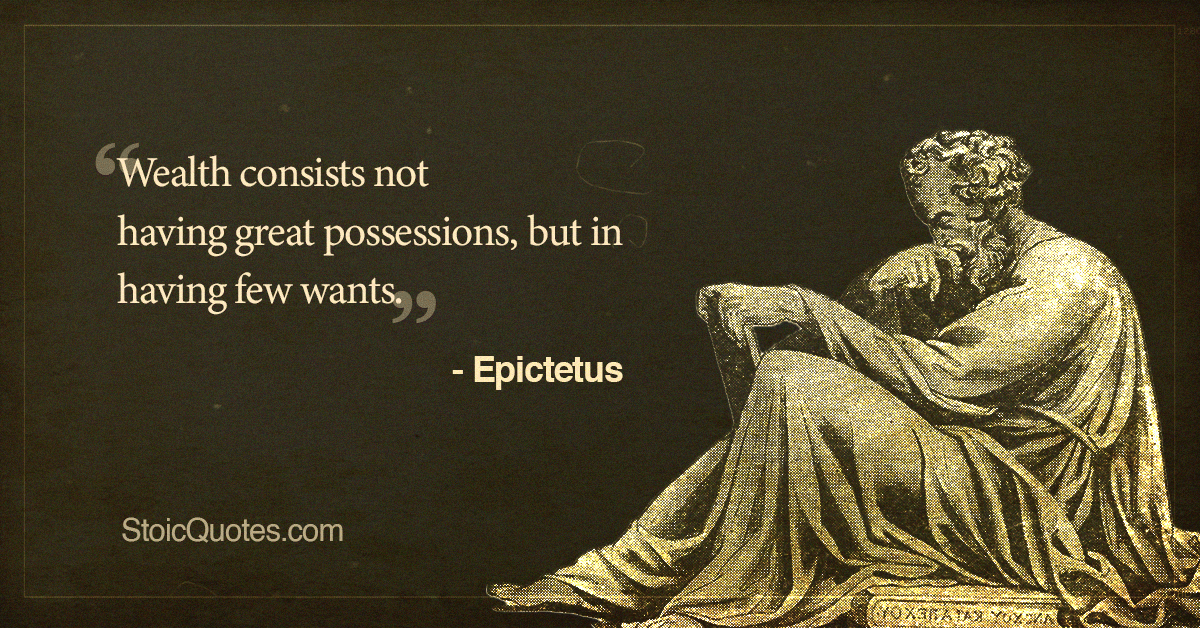
What would it mean for you to live a successful life? While Merriam-Webster defines it as “the fact of getting or achieving wealth, respect, or fame,” Epictetus is here to disagree.
“Wealth consists not in having great possessions, but in having few wants.”
-Epictetus
Epictetus sure has a knack for taking profound concepts and summing them up in short, memorable quotes, doesn’t he? When we think of wealth, we think of people who can afford to live a lavish lifestyle. However, somewhere deep in us, we all fundamentally know that, while money might make life easier in some regards, it won’t make us happy or even necessarily successful.
Rather than getting caught up in the materialistic concepts of success that float around the cultural psyche, what if you instead changed what wealth (and success) means to you? Wealth, in this regard, is actually just a matter of mindset rather than a process of accruing material possessions.
“Nothing great is created suddenly, any more than a bunch of grapes or a fig. If you tell me that you desire a fig. I answer you that there must be time. Let it first blossom, then bear fruit, then ripen.”
-Epictetus
You don’t have to look far these days to find people who claim they have the secret to getting rich quick. At the end of the day, though, success and wealth aren’t things that happen overnight.
Even when you look into the latest booming tech startup that seems to have come out of nowhere, you’ll find that the seeds of the idea were originally planted years if not decades previously.
To be successful, you will want to first look inside yourself and determine what that means to you. Rather than hoping that the things you want in life will simply appear, understand that you must treat your goals like a flowering plant. It is only with time that truly sustainable and deep success can be achieved.
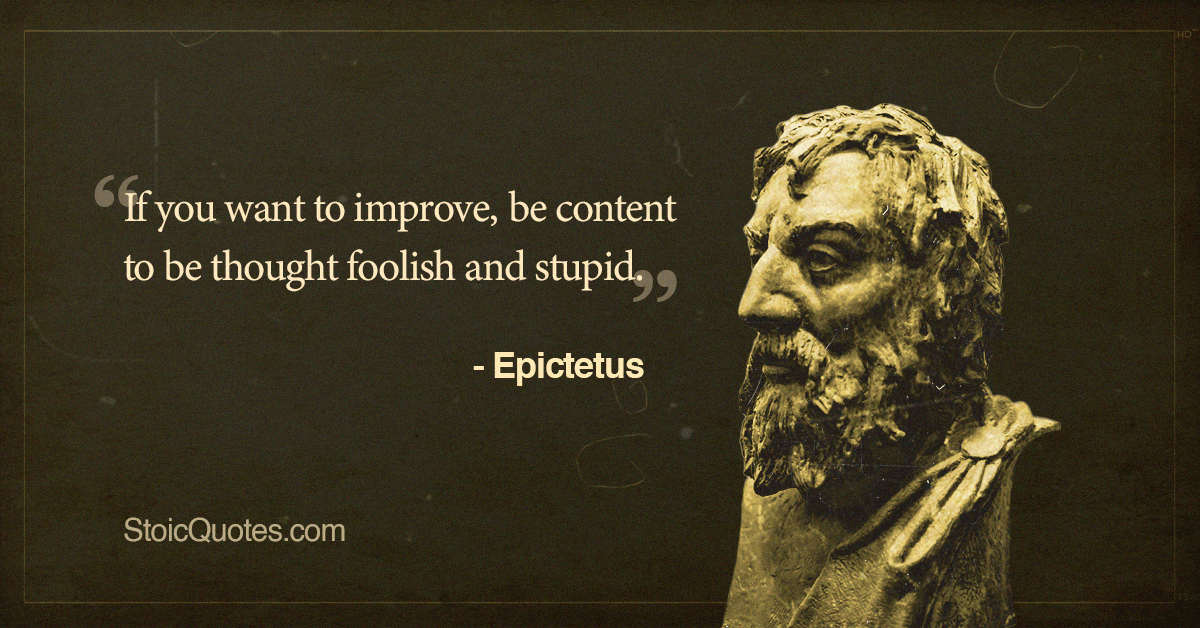
Have you ever tried to talk to someone about the ways you want to improve yourself, only to have them tell you that you’re perfect the way you are? While this can be flattering, it isn’t very useful to actually achieve the growth and development you seek. In the quotes of Epictetus, you can find practical advice in how to exercise your will in order to achieve self-improvement.
“If you want to improve, be content to be thought foolish and stupid.”
-Epictetus
This is one of those quotes that really drives home the reality that humans really haven’t changed that much in the last few thousand years. Have you ever wanted to do something, but refrained for fear that others would make fun of you or think you’re stupid? If you’re honest with yourself, the answer is probably a resounding yes.
The broader context of this quote points out that Epictetus is specifically talking about improving your character through following the tenets of Stoic philosophy. He goes on to say that the more you desire to acquire external things, whether it be expensive stuff or affirmation from others, the more difficult your path will be towards achieving a good character. If you’re really paying attention to living a virtuous life, you won’t be wasting time thinking about what others think of you, but if you’re solely focusing on the opinions of others, you won’t be paying enough attention to the acquisition of good character.
“First say to yourself what you would be, and then do what you have to do.”
-Epictetus
If you aren’t happy with who you are, you first need to identify who it is that you desire to be. Without determining the destination you’re trying to get to, you’re probably not going to arrive there.
The next step after you figure out who you want to be in your life is to take the necessary steps towards this goal. After all, putting a tack in a map on the wall is a great first step towards going on a journey, but that’s only the first step. In order to achieve the good life that you want to live, you will need to exercise your will and “do what you have to do” to make your dream a reality.
(Are you looking for more Stoic quotes to help you in your quest for self-improvement? Check out the best quotes by Marcus Aurelius.)
If you adopt the idea that challenges are essential tools for growth, you can radically change your life. It’s easy to want to shirk away from obstacles or problems, but it's through overcoming them that you can identify both your strengths and your weaknesses.
“Difficulties are things that show a person what they are.”
-Epictetus
Have you ever faced a challenging situation and been surprised by the way you reacted? Perhaps you always expected heroism of yourself and actually found cowardice and fear when the rubber hit the road, or perhaps you found yourself to be far more competent than you would have expected in face of an emergency.
Either way, these are valuable opportunities to learn who you really are. Everyone can go through the motions when life is swimming along as normal, but what happens when a catastrophic event shows up to lift the veil off of everyday life?
Whether it’s a death of a loved one, infidelity on the part of a spouse you once trusted, a natural disaster that destroys your home, or something much more mundane, difficulties allow you to confront the stuff you’re made of. Though no one wants to be let go from their job without notice or get into a bad car accident, you might just find that the challenges you face offer you the information you need to truly become who you want to be.
“The greater the difficulty the more glory in surmounting it. Skillful pilots gain their reputation from storms and tempests.”
-Epictetus
Adding on to the previous quote, this Epictetus quote highlights the way that glory and reputation are intrinsically connected to an individual’s ability to overcome obstacles. The larger the difficulty you faced, the grander you can become in the eyes of others. It’s important to note, though, that glory and reputation are exactly the types of external objects that Epictetus warns are out of your control.
What this means is that the greater the difficulty you overcome, the more attention and affirmation you might receive for who you are. While many might think this to be a good thing, in Epictetus’ view, this actually makes the task of staying steadfast to living by Stoic philosophy even more difficult. In order to stay the path towards a good life, you will have to be all the more committed to identifying what is and isn’t in your control.
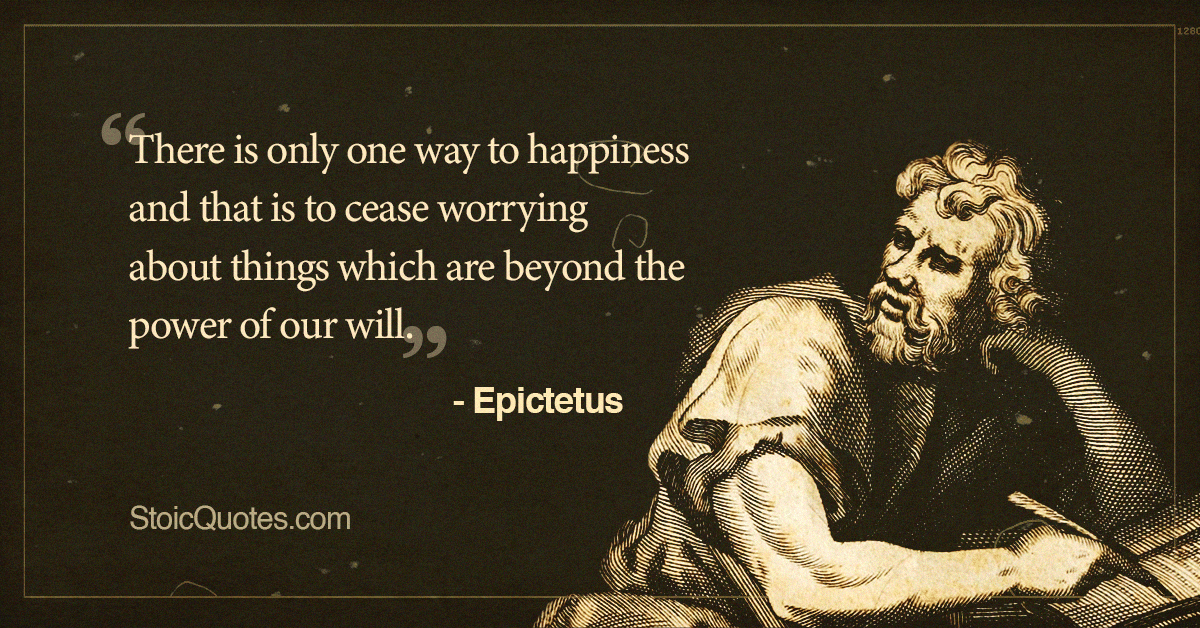
As mentioned above, the idea of Eudaimonia is prevalent in Stoic thought, which is commonly translated as “happiness” or “welfare.” Within this philosophy, happiness doesn’t lie in external goods. Instead, moral virtue is required to live a happy life, and, they argue, living a morally virtuous life is enough in itself to give obtain a “good spirit.”
“The essence of philosophy is that a man should so live that his happiness shall depend as little as possible on external things.”
-Epictetus
If world peace is the only thing that will make you happy, living in the 21st century is probably going to be a tough road for you. Additionally, if the only thing that will make you happy is a Lambo and an ocean-front mansion, you’re going to postpone happiness until you obtain these things, and will probably be pretty disappointed by the fleeting and superficial sense of happiness that material possessions can provide even if you do strike it rich.
Epictetus argues that if you want to be happy, don’t make your happiness rely on external forces or things. If you can instead find happiness within yourself, you will have a far greater chance of living a happy life.
“There is only one way to happiness and that is to cease worrying about things which are beyond the power of our will.”
-Epictetus
How much time do you spend worrying about things that you ultimately have no control over?
When you worry about things that are outside the bounds of your will, it’s like putting your foot on the gas pedal while the car is still in park. You’re just burning fuel, expending energy, and putting stress on the mechanisms that allow your car to drive. After all that, you’re still sitting in the exact same place you started.
According to Epictetus, if you really want to be happy, you need to learn to let go of your anxieties about things outside of your control. Consider taking the energy you would put towards worrying about what others think of you, whether the housing market is going to crash, and so on, and channeling it towards the aspects of your life that you can change for the better.
Finally, let’s take a look at some of the best Epictetus quotes on control. Here we will delve into just how much of what you experience the philosopher believes is outside of one's control, and the few parts of life where you are able to exercise your will to change your life.
“Some things are within our power, while others are not. Within our power are opinion, motivation, desire, aversion, and, in a word, whatever is of our own doing; not within our power are our body, our property, reputation, office, and, in a word, whatever is not of our own doing.”
-Epictetus
We’ve already talked a lot about one of Epictetus’ primary philosophical tenets: that you have to identify what is external to you (and therefore out of your control) and what is within your control. In this quote, he breaks this down further to help us understand where he makes the division between external and internal phenomena.
The things that we can control, in his view, are the things that we do. These aren’t just our actions, but the way that we think about and respond to external occurrences. What is contained in the sphere of things outside of our control is nearly everything– not just far away geopolitical events or the weather but also our reputation, our home, and even our own bodies.
"If you want your children and wife and friends to live forever, you’re a fool, because you’re wanting things that aren’t within your power to be within your power, and the things that aren’t your own to be your own."
-Epictetus
In this quote, we can see just how far Epictetus takes the notion of control. Most of us are probably guilty of wishing that our loved ones would live forever, but in his view, this makes us fools. The death of the people around us is inevitable just as our own death is, and in this way, we must accept that it isn’t within our power.
Identifying what is yours and what isn’t can potentially create a radical shift in the way you live your life if you let it. Not only does this mean letting go of what others think of us, but it also means finding acceptance within ourselves that we can’t control what others do. In the quotes of Epictetus, we can find specific guidance on what it means to take responsibility for what you can change and accept what you simply cannot.
When you study Stoic philosophy, you are exposing yourself to ideas that can allow you to actually create positive change in your life. For more valuable resources to help you in your quest to live a good life, check out the ever-expanding library of articles available at StoicQuotes.com.
We encourage you to share this article on Twitter and Facebook. Just click those two links - you'll see why.
It's important to share the news to spread the truth. Most people won't.